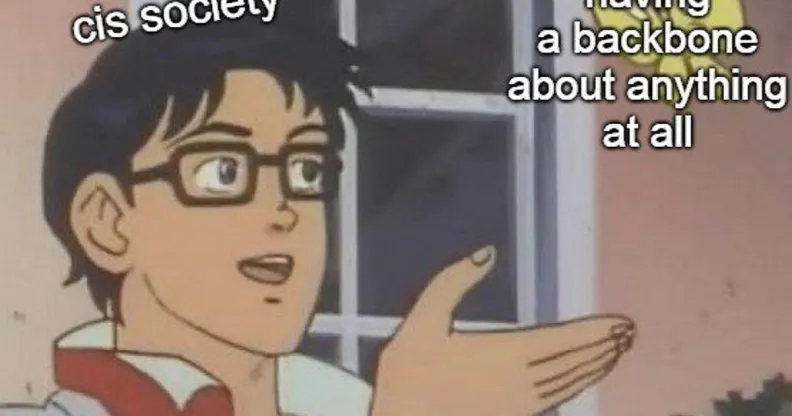This viral meme explains exactly what it’s like to be transgender and proud

(amyrmarv/twitter)
It’s not easy being transgender.
Despite a scientific study showing that trans people are born that way, many dispute the existence of anyone who’s not cisgender.
Just last month, Piers Morgan continued his year-long rampage against non-binary and genderfluid people, claiming that genderfluid people were “damaging to society.”

(Alberto E. Rodriguez/Getty)
The premiere of the Genderquake series of documentaries on Channel 4 on May 7 sparked controversy after a trans man was outed by another participant.
In the US, eight trans people have been killed this year, after a year which saw the highest number of trans killings – 28 – on record.
And if that wasn’t enough, trans people often face obstacles while simply trying to assert their basic humanity.

(Jordan Mansfield/Getty)
The women’s FA Cup final on May 5 was tainted by the anti-trans leaflets which were distributed to fans at Wembley Stadium.
But sometimes, a meme comes along which offers an opportunity to get back at anti-trans people.
And that’s exactly what Amy Marvin, who teaches Trans Studies, Trans Literature and Trans Philosophy at the University of Oregon, has done.

Amy Marvin (amyrmarv/twitter)
The self-described feminist philosopher has used the Is This a Pigeon? meme to get her point across.
The meme’s protagonist, who is pictured in his Japanese anime show The Brave Fighter of Sun Fighbird, is labelled as “cis society.”
While staring at a yellow butterfly, he asks: “Is this destroying my free speech?”

(amyrmarv/twitter)
The post has attracted more than 15,000 retweets and likes.
Speaking to PinkNews, Marvin explained that she created the trans-friendly version of the meme to highlight the difficulties faced by trans people who simply want equality.
“I’m teaching a course on Transgender Studies this term,” she said. “The current unit is on visibility and how it’s complicated for trans people in a lot of ways.
“We just went over backlash to the ‘transgender moment,’ and I’m interested in the ways trans people fighting for power over our lives gets ballooned up as a threat to society at large.
“So the meme seemed like a good way of expressing this general pattern!”

(Mark Makela/Getty)
And she said that so far, “the reaction has been mostly positive!
“I already built a few things into the meme to avoid some negative reactions, like labelling it ‘cis society’ rather than cis people.
“I think every time a meme, and especially a trans meme, becomes popular there’s some risk of it attracting harassment,” she added.
“So there’s a moment of waiting for a potential backlash because I put a critical suggestion out there.
“But the negative responses have mostly been unclear or missing the point or not really engaging in an interesting way so far, so I’m mostly responding by keeping up my good humour!”
Anti-trans activists, like many hateful right-wing campaigners, can often be heard complaining that another person’s equality detracts from their own privilege.
In March, an event in Parliament called “Transgenderism and the War on Women” featured a presentation entitled “transgenderism and the assault on feminism.”

(Spencer Platt/Getty)
Australian academic Sheila Jefferys opened the event by saying: “Men can’t become women, what’s so difficult about that?”
Jefferys went on to criticise the “trend of fashionable transgenderism” that she claimed had been inspired by the internet and representations of trans women in media.
She blamed the apparent rise in numbers of transgender people on the internet, describing trans rights as “[one of many] internet-exploited sexual fetishes that try to make themselves a rights movement.”

Jeffreys in 2009 (Terri Strange/Youtube)
The controversial academic, who has also said that raising transgender children is comparable to child abuse, then compared trans people to parasites.
Jeffreys initially said that trans women “parasitically occupy” women’s bodies in order to be seen as women, in a bizarre metaphor.
She said that “when men claim to be women… and parasitically occupy the bodies of the oppressed, they speak for the oppressed.
“They become to be recognised as the oppressed. There’s no space for women’s liberation.”

